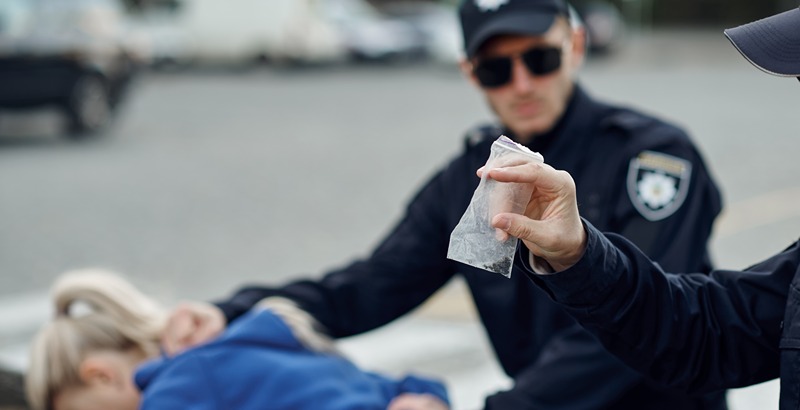Arizona Drug Paraphernalia Offense Under A.R.S 13-3415

This article discusses the following:
- What is Considered Drug Paraphernalia in Arizona
- How the Court Determines What is Considered Drug Paraphernalia
- Is Drug Paraphernalia Legal to Sell and Purchase in Arizona?
- Penalties for Drug Paraphernalia Offense
- Defenses Against Drug Paraphernalia Charges
- Constitutional Considerations: Search and Seizure in Drug Paraphernalia Cases
- How a Criminal Defense Attorney Can Help
Facing an accusation of drug paraphernalia possession in Arizona, under A.R.S 13-3415, can be a stressful and confusing experience.
At Kolsrud Law Offices, we specialize in providing expert legal assistance in these situations. Our aim with this article is to offer clear, detailed insights into Arizona's drug paraphernalia laws, helping those accused understand the charges against them and the potential legal outcomes. With our experienced legal team, we are dedicated to ensuring your rights are upheld and providing the guidance you need during this challenging time.
In 2022, the FBI reported a total of 907,958 arrests for drug offenses in the United States. Of these, 110,771 were for the sale or manufacture of any drug, and a staggering 797,187 were for possession of any drug.

What is Considered Drug Paraphernalia in Arizona
According to A.R.S 13-3415, "drug paraphernalia" encompasses a wide range of equipment, products, and materials that are used, intended for use, or designed for use in various activities related to illegal drugs.
This includes, but is not limited to: actions such as planting, cultivating, manufacturing, processing, preparing, testing, packaging, storing, and introducing drugs into the human body.
- Broad Scope of Items: The statute categorizes paraphernalia into several groups based on their intended use, including:
- (a) Kits for planting or harvesting plants that can be used as drugs.
- (b) Kits for manufacturing or processing drugs.
- (c) Devices for increasing the potency of plant-based drugs.
- (d) Equipment for testing drugs, except narcotic drug testing products for fentanyl or its analogs.
- (e) Scales and balances for weighing or measuring drugs.
- (f) Materials used in cutting drugs, like diluents and adulterants.
- (g) Tools for refining marijuana.
- (h) Devices like blenders and containers used in compounding drugs.
- (i) Small containers for packaging drugs.
- (j) Objects for storing or concealing drugs.
- (k) Syringes and needles for injecting drugs.
- (l) Various objects used for ingesting or inhaling drugs, including pipes, water pipes, carburetion devices, smoking masks, roach clips, cocaine spoons and vials, and various types of pipes and bongs.
The possession, use, or intent to use these items in relation to illegal drugs can lead to serious legal consequences under Arizona law.
Contact us today to schedule a
FREE CONSULTATION and learn
how we can help you.
How the Court Determines What is Considered Drug Paraphernalia
The determination of whether an object is classified as drug paraphernalia in a court of law involves a comprehensive consideration of various factors. Arizona Revised Statutes provide a clear framework for this assessment.
When evaluating an object, the court or relevant authority takes into account several relevant factors:
- Statements Regarding Use: Evaluating any declarations made by the owner or person in control of the object about its intended use.
- Prior Convictions: Considering any previous convictions of the owner or controller of the object related to drug offenses.
- Proximity to Drug Violations: Assessing how close, both in time and space, the object was found in relation to a direct violation of drug laws.
- Nearness to Drugs: The closeness of the object to actual drugs.
- Residue Evidence: Checking for the presence of any drug residue on the object.
- Intent to Deliver: Investigating whether there is any evidence, direct or circumstantial, that the owner intended to deliver the object to others for the purpose of facilitating drug violations.
- Usage Instructions: Looking at any instructions, whether oral or written, provided with the object about how to use it.
- Descriptive Materials: Examining any accompanying materials that explain or show how the object should be used.
- Advertising: Considering national and local advertising that discusses the use of the object.
- Display Manner for Sale: Observing how the object is displayed for sale.
- Legitimacy of Supplier: Determining whether the owner or controller is a legitimate supplier of similar or related items, like a licensed tobacco dealer.
- Sales Ratio: Analyzing the ratio of sales of the object in question to the total sales of the business.
- Legitimate Uses: Evaluating the existence and extent of legitimate uses for the object within the community.
- Expert Testimony: Taking into account expert testimony regarding the use of the object.
These factors collectively guide the court in making an informed decision about whether an object qualifies as drug paraphernalia.

Is Drug Paraphernalia Legal to Sell and Purchase in Arizona?
In Arizona, as in many states, selling and purchasing drug paraphernalia is illegal
although the enforcement and application of these laws can be complex.
- Legal Definition and Criminal Implications: Under Arizona law, drug paraphernalia encompasses a range of equipment, products, and materials intended or designed for use in making, using, or concealing illegal drugs. The Arizona Revised Statute §13-3415 makes it unlawful to use, or possess with intent to use, any drug paraphernalia.
- Marketing Loopholes and Tactics: Despite the statute's strictures, smoke shops, online retailers, and even some convenience stores in Phoenix and other parts of Arizona might sell items that could be used as drug paraphernalia. These businesses often exploit legal loopholes by marketing these items for purposes ostensibly unrelated to illegal drug use. For instance, a pipe could be sold as a "novelty tobacco pipe," ostensibly for legal substances, skirting the line of legality under Arizona law.
- Transformation of Legal Items into Paraphernalia: In Arizona, the legal status of an item can shift based on its use. If an object sold legally is later used for consuming, producing, or storing illegal drugs, it becomes unlawful paraphernalia. Law enforcement officials often look for evidence of such illegal use, like drug residue, to substantiate charges.
Awareness of how items are marketed, used, and potentially prosecuted under the law is critical, particularly for those facing related criminal charges.
Penalties for Drug Paraphernalia Offense
In Arizona, possession of drug paraphernalia is typically classified as a Class 6 felony under A.R.S 13-3415, carrying significant penalties.
For first-time offenders, imprisonment can range from four months to two years. However, this duration can increase for those with prior felony convictions. Additionally, substantial fines are often imposed, potentially amounting to thousands of dollars.
A conviction also results in a criminal record, which can adversely impact employment, housing, and education opportunities.
In certain cases, alternatives such as plea bargains or diversion programs may be available, especially for first-time offenders, which could lead to reduced charges or alternative sentencing.
However, aggravating factors like previous offenses can result in harsher penalties. It's essential for individuals facing these charges to seek legal advice for guidance and to explore potential defense strategies.

Defenses Against Drug Paraphernalia Charges
In Arizona, individuals charged with drug paraphernalia offenses under A.R.S 13-3415 have several potential defenses available, depending on the specifics of their case.
Common defenses include:
Lack of Knowledge:
Arguing that the accused was not aware of the presence or the illicit nature of the paraphernalia. This defense is based on the premise that one cannot be guilty of possession if they were unaware of the item's existence or its intended use for drug-related activities.
Lack of Possession or Control:
Challenging the accusation by demonstrating that the individual did not have actual or constructive possession of the paraphernalia. This could mean showing that the accused had no physical control over the item or was not aware of its presence.
Unlawful Search and Seizure:
Contesting the legality of how the evidence was obtained. If law enforcement violated the accused’s constitutional rights during the search and seizure process, the evidence could be deemed inadmissible in court.
Misidentification of the Object:
Arguing that the item in question is not drug paraphernalia but rather an object for legal and legitimate use. This could involve providing evidence of the item's intended use, which is not related to drug activities.
Entrapment:
Suggesting that the accused was induced by law enforcement to commit a crime they would not have otherwise engaged in. This defense is applicable in cases where there is evidence of coercion or manipulation by police.
Insufficient Evidence
Highlighting the lack of concrete evidence linking the accused to the paraphernalia, such as fingerprints or DNA.
Each case is unique, and the viability of these defenses depends on the specific details and evidence of the case. An experienced criminal defense attorney can assess these factors and advise on the most appropriate defense strategy.
Constitutional Considerations: Search and Seizure in Drug Paraphernalia Cases
A search and seizure might be unconstitutional in several scenarios. For example, if police conduct a vehicle search based solely on a hunch, without a warrant, probable cause, or the driver's consent, any discovered paraphernalia may not be admissible in court.
Similarly, entering and searching a person’s home without a warrant, exigent circumstances, or the homeowner's permission is typically considered a violation of constitutional rights.
In these situations, a skilled criminal defense attorney can argue that the evidence, such as drug paraphernalia, was obtained unlawfully and should be excluded.
Another instance where constitutional issues arise is during pedestrian stops. If an individual is stopped and searched without reasonable suspicion of criminal activity and drug paraphernalia is found, this might constitute an unconstitutional search.
How a Criminal Defense Attorney Can Help
An award-winning criminal defense attorney Since 2006
Why Choose Josh Kolsrud
With over 100 jury trials to his name, and years of experience as a state and federal prosecutor, Josh understands the law, the legal process, and your rights. Josh is also committed to representing every client with utmost integrity and dedication
Experience
Josh has prosecuted major crimes on the state and federal level, led a successful anti-human sex trafficking operation that saved lives, and argued before countless juries and justices for his clients
Expertise
Josh is an expert in both Arizona and federal criminal law, and is ready to put that expertise to work for you.
Dedication
As a prosecutor, Josh saw far too many defendants lose their livelihood due to poor representation. Josh will always give every client his complete attention and effort
Get a Free Initial Consultation:
Complete our form below to get a free case review.
or call us at (480) 999-9444.
